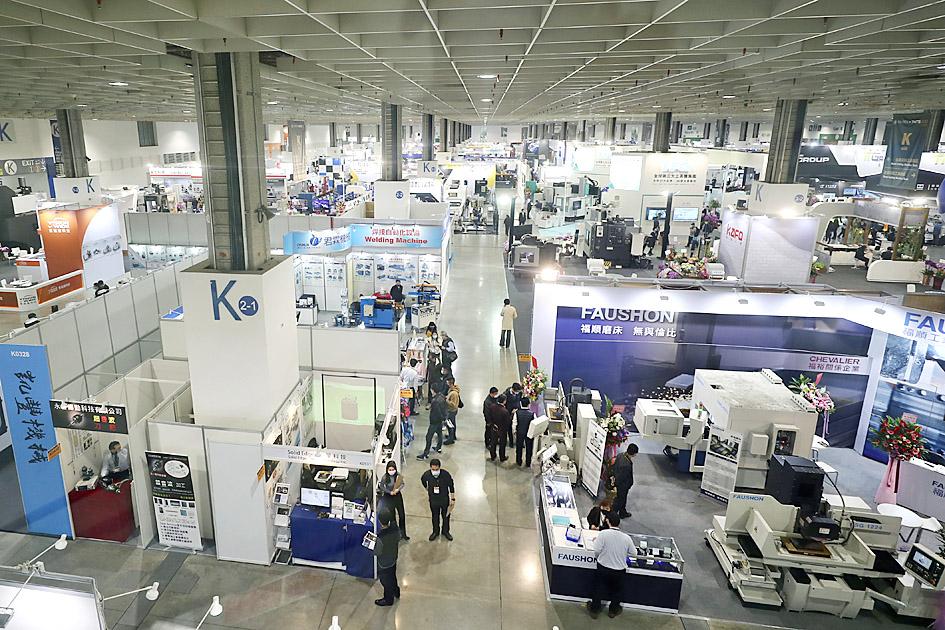The production value of Taiwan’s machinery industry is expected to rise about 15 percent this year from last year on the back of strong demand, the Taiwan Association of Machinery Industry (台灣機械公會) said yesterday.
Association chairman Larry Wei (魏燦文) told reporters that global demand is expected to keep rising this year as high-end precision and smart manufacturing increase the pressure on manufacturers to upgrade.
The industry’s production value this year is expected to be NT$1.5 trillion (US$53.80 billion), up NT$200 billion, or about 15 percent, from a year earlier, Wei said.

Photo: Ritchie B. Tongo, EPA-EFE
Machinery exports are expected to grow 15 percent year-on-year this year, he said.
Last year, the output value of Taiwan’s machinery sector rose to NT$1.3 trillion, while exports grew 27 percent year-on-year to a new high of US$33.14 billion.
The industry’s exports have been growing steadily for the past 17 months.
The smart manufacturing trend means that smart machinery is gradually replacing traditional machinery in the global manufacturing sector, which will boost the local sector, Wei said.
The COVID-19 pandemic sent ripples through the global supply chain, with the importance of the Chinese manufacturing industry being undercut in the past two years, creating more business opportunities for Taiwanese manufacturers and raising local production, he said.
Taiwanese machinery suppliers have set their sights on the Turkish market, which has been a springboard for exporters to reach markets in the Middle East and Europe, he said.
Hopefully, tensions between Russia and Ukraine would ease, because geopolitical chaos would affect demand in the global machinery market, Wei said.
Alex Ko (柯拔希), head of a new business alliance dedicated to smart manufacturing in Taiwan, said that he was upbeat about the local industry, forecasting that output would top NT$2 trillion in 2025.
The alliance, which was set up on Monday, is made up of 30 machine tool manufacturers, including Victor Taichung Machinery Works Co (台中精機), Taiwan Takisawa Technology Co (台灣瀧澤) and Tongtai Machine and Tool Co (東台精機).
The output value of Taiwan’s machine tools is expected to reach NT$108.2 billion this year, Wei said.
Separately, the TIMTOS TMTS trade exhibition organized by the Taipei International Machine Tool Show and Taiwan International Machine Tool Show opened at the Taipei Nangang Exhibition Center’s Hall 1 and 2 on Monday.
The organizers said that the event would promote Taiwan’s strength in machinery production.
The exhibition is to end on Saturday.

Power supply and electronic components maker Delta Electronics Inc (台達電) yesterday said second-quarter revenue is expected to surpass the first quarter, which rose 30 percent year-on-year to NT$118.92 billion (US$3.71 billion). Revenue this quarter is likely to grow, as US clients have front-loaded orders ahead of US President Donald Trump’s planned tariffs on Taiwanese goods, Delta chairman Ping Cheng (鄭平) said at an earnings conference in Taipei, referring to the 90-day pause in tariff implementation Trump announced on April 9. While situations in the third and fourth quarters remain unclear, “We will not halt our long-term deployments and do not plan to

‘SHORT TERM’: The local currency would likely remain strong in the near term, driven by anticipated US trade pressure, capital inflows and expectations of a US Fed rate cut The US dollar is expected to fall below NT$30 in the near term, as traders anticipate increased pressure from Washington for Taiwan to allow the New Taiwan dollar to appreciate, Cathay United Bank (國泰世華銀行) chief economist Lin Chi-chao (林啟超) said. Following a sharp drop in the greenback against the NT dollar on Friday, Lin told the Central News Agency that the local currency is likely to remain strong in the short term, driven in part by market psychology surrounding anticipated US policy pressure. On Friday, the US dollar fell NT$0.953, or 3.07 percent, closing at NT$31.064 — its lowest level since Jan.

The US dollar was trading at NT$29.7 at 10am today on the Taipei Foreign Exchange, as the New Taiwan dollar gained NT$1.364 from the previous close last week. The NT dollar continued to rise today, after surging 3.07 percent on Friday. After opening at NT$30.91, the NT dollar gained more than NT$1 in just 15 minutes, briefly passing the NT$30 mark. Before the US Department of the Treasury's semi-annual currency report came out, expectations that the NT dollar would keep rising were already building. The NT dollar on Friday closed at NT$31.064, up by NT$0.953 — a 3.07 percent single-day gain. Today,

The New Taiwan dollar and Taiwanese stocks surged on signs that trade tensions between the world’s top two economies might start easing and as US tech earnings boosted the outlook of the nation’s semiconductor exports. The NT dollar strengthened as much as 3.8 percent versus the US dollar to 30.815, the biggest intraday gain since January 2011, closing at NT$31.064. The benchmark TAIEX jumped 2.73 percent to outperform the region’s equity gauges. Outlook for global trade improved after China said it is assessing possible trade talks with the US, providing a boost for the nation’s currency and shares. As the NT dollar